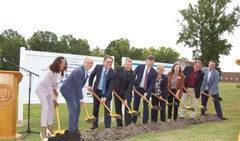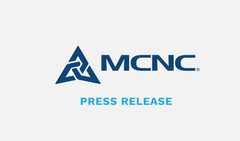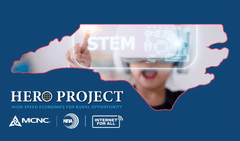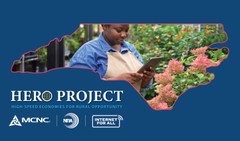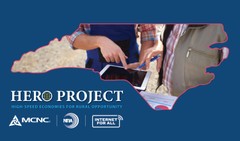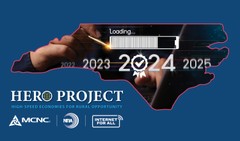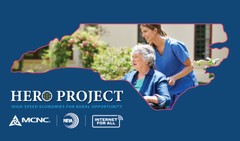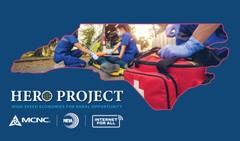HERO Project: Broadband in postsecondary education helps make NC a better place to work

The MCNC HERO (High Speed Economies for Rural Opportunities) Project aims to ensure every community in North Carolina has what it needs to fully participate in today’s society. Once the project is complete, it will extend MCNC’s 4,500-mile fiber network another 209 miles through substantially unserved and underserved areas – including some of the highest poverty areas in the state.
MCNC’s commitment to expand and upgrade its network provides the foundation for opportunity, efficiency, and acquisition of knowledge for all levels of education across North Carolina. And, one of the more important educational sectors in the state today happens for students right after high school.
Broadband to Support Enrollment Demands
MCNC is the state’s leading broadband provider for interconnecting North Carolina’s postsecondary education institutions with each other and the world. Each is increasingly integrating broadband-dependent technologies in curriculum and administration, and access is required for students, faculty and staff (both on and off campus). Implementation of new digital learning environments is further proof that demand for middle-mile bandwidth in postsecondary education continues to rise.
For more than 40 years, MCNC has been meeting the broadband needs for these community institutions whether rural or urban, mountain or coastal, big or small. The HERO Project has the potential to transform several of these regions in North Carolina, paving the way for an inclusive and prosperous future that gives our great minds of today the ability to do amazing things tomorrow.
High Speed for Higher Education
Over the past decade, broadband has transformed online learning nationwide. In 2012, according to National Center for Education Statistics, 75 percent of college students took all their classes in person. Those numbers flipped dramatically during the pandemic, with just 26 percent of college students in 2020 reporting that they took no online classes. Now, more than 10 million college students across the country took at least one distance education class last fall semester.
North Carolina colleges and universities have been valued clients and collaborators with MCNC since the 1980s. There are at least 53 schools currently offering four-year degrees in North Carolina (with about 70,000 undergraduate students enrolled), and MCNC is proud to support each of these world-class institutions. See how MCNC serves higher education.
Connectivity for Modern Community Colleges
The North Carolina Community College System (NCCCS) is the third largest community college system in the United States. The total headcount of full-time NCCCS students in fall 2023 was 393,227 – serving nearly 600,000 students annually at 58 institutions across the state. There are four community colleges located on the HERO Project routes that will benefit from the project.
Since 2010, MCNC has worked with NCCCS to push the boundaries of bandwidth to create innovative learning environments; providing students a broadband infrastructure that can grow to meet their education needs at stable costs. This level of connectivity helps NCCCS students build new ideas as well as a better prepared workforce. See how MCNC serves community colleges.
Don’t Forget the Trades and Professional Development
The landscape of education and work continues to shift, and postsecondary education in North Carolina has been adapting to the changing needs of students and employers.
There has been a national uptick in vocational program enrollment, and North Carolina has reflected this trend as seen in the postsecondary enrollment data published in the NCCCS Data Dashboards. There isn't a definitive number of trade schools currently in the state. However, whether you are interested in taking a few courses, pursuing a degree or obtaining a trade apprenticeship, North Carolina has a wide range of schools that offer instruction in robotics, HVAC, plumbing, public safety, engineering, cosmetology, automotive, carpentry, welding, and much more.
The personalized learning revolution continues to be complex, primarily because of the bandwidth and back-office applications required to run it. The software is robust, especially behind the scenes for educators, which means that the network also must be, too – this is where MCNC comes in.
It All Adds Up
Access to high-speed internet is essential for individuals, communities and businesses to thrive modern North Carolina. Unfortunately, many areas still struggle with inadequate or non-existent broadband. The 11 total counties to benefit from the HERO Project will positively impact more than 350,000 housing units and 696 community anchor institutions. View our Community Map.
High-speed internet is essential for economic development and job creation in rural areas. According to an FCC study, broadband deployment in rural areas can create up to 10 jobs per 100 households. The study also found that broadband can increase wages in rural areas by up to 6 percent. According to a recent report by the Center on Education and the Workforce (CEW) at Georgetown University, 72 percent of all jobs in the U.S. will require postsecondary education and/or training by 2031.
The workforce landscape is certainly changing and changing rapidly; driven by key trends in technology, demographics and globalization. These changes are having a significant impact on the way people work, all of which broadband touches in some form or fashion. We are seeing a rise in a new remote workforce, growth in the gig (freelance) economy, a focus in diversity and inclusion, and new efforts by workers who are willing to upskill and reskill their careers in order to stay competitive.
The significance of broadband in expanding job prospects within North Carolina cannot be overstated, and connectivity is a powerful tool that can empower an educated and thriving workforce.
MCNC is North Carolina’s Community Anchor Network
Investing in broadband infrastructure is an investment in the future, and the HERO Project is part of a long-term endeavor to protect as well as unlock the full potential of everyone in North Carolina. In just the last five years, MCNC has invested more than $60 million in the proper upkeep and expansion of its network, including the HERO Project at roughly $19 million. This level of ongoing commitment allows MCNC to cost-effectively meeting the bandwidth needs of North Carolina communities.
Construction is expected to begin this summer with completion planned for June 2025.
